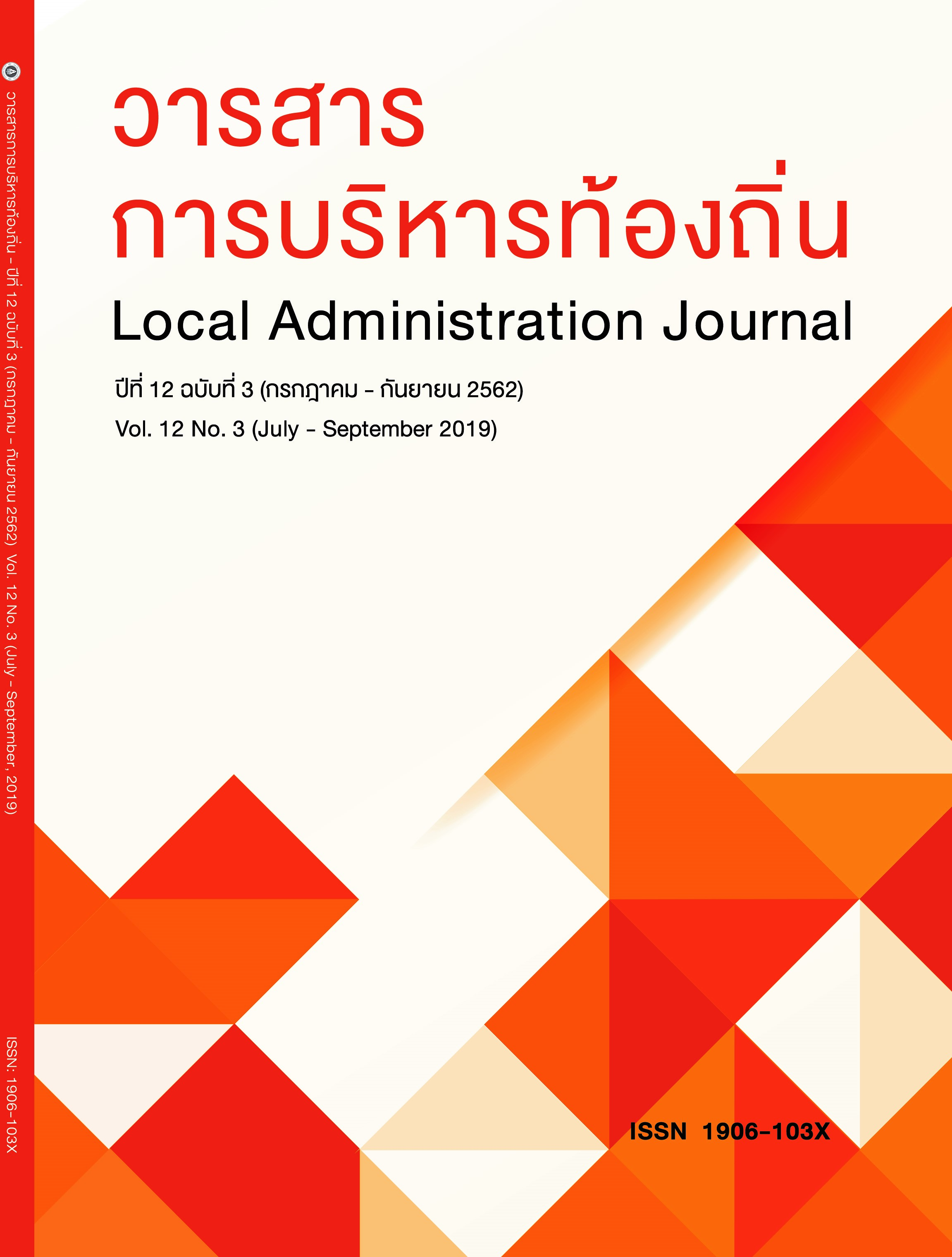The Development of Organizational Competencies for Local Administrative Organization at Special Economic Zones
Keywords:
Organizational Competencies, Local Administrative Organizations, Special Economic ZonesAbstract
The objective of this research were: to study factors of organizational competencies for local administrative organizations in special economic zones; to find the appropriate organizational competencies model for local administrative organizations in special economic zones; and to develop factors or model of each appropriate variables and can use in development to organizational competencies. The approach of this research was a mixed method. The quantitative research was conducted by studying the population of chief executive officers and permanent secretaries of the local administrative organizations in special economic zones. The sample size of 82 local administrative organizations was drawn and resulted in 164 usable questionnaires. In the qualitative part, in-depth interviews of five key informants were conducted.
The research found four dimensions of local administrative organizations’ organizational competencies including strategic managerial-based competencies, resources–based competencies, performance-based competencies and transformation-based competencies. The findings indicated that the overall the appropriateness of organizational competencies were high. When focusing on each individual dimension, the finding indicated that transformation-based competencies had maximum averaged ( = 4.08) and performance-based competencies had minimum averaged ( = 3.90). Core competency factor can be divided in to seven groups of factor including transformation-based competencies, strategic managerial- based competencies, performance-based competencies, human resources–based competencies, measurement and evaluation-based competencies, participation and equality-based competencies and motivation-based competencies.
References
จาตุรนต์ ทองหวั่น และพรอัมรินทร์ พรหมเกิด. (2561). กระบวนทัศน์เบื้องต้นในการพัฒนาสมรรถนะองค์การขององค์กรปกครองส่วนท้องถิ่นในพื้นที่เขตพัฒนาเศรษฐกิจพิเศษ. วารสารการบริหารท้องถิ่น, 11(2), 1-22.
บุญศรี พรหมมาพันธ์ และเสน่ห์ จุ้ยโต. (2550). แบบจำลององค์การบริหารส่วนตำบลสู่องค์การมุ่งเน้นกลยุทธ์ โดยนำ Balanced Scorecard มาประยุกต์ใช้. กรุงเทพฯ: สำนักงานคณะกรรมการวิจัยแห่งชาติ.
ระพีพร คณะพล, สัญญา เคณาภูมิ และยุภาพร ยุภาศ. (2560). นวัตกรรมการสร้างความเป็นหุ้นส่วนทางการบริหารงานท้องถิ่นในจังหวัดถนนยุทธศาสตร์ลุ่มแม่น้ำโขงภาคตะวันออกเฉียงเหนือ. วารสารการบริหารท้องถิ่น, 10(3), 52-76.
ศุภชัย ยาวะประภาษ. (2544). การวิจัยทางรัฐประศาสนศาสตร์. กรุงเทพฯ: ภาควิชารัฐประศาสนศาสตร์
คณะรัฐศาสตร์จุฬาลงกรณ์มหาวิทยาลัย.
สุวิมล ติรกานันท์. (2546). การใช้สถิติในงานวิจัยทางสังคมศาสตร์: แนวทางสู่การปฏิบัติ. กรุงเทพฯ: โรงพิมพ์
แห่งจุฬาลงกรณ์มหาวิทยาลัย.
เสน่ห์ จุ้ยโต. (2554). การพัฒนาขีดสมรรถนะบุคลากรขององค์กรปกครองส่วนท้องถิ่น. วารสารการจัดการสมัยใหม่, 8(2), 33-67.
สำนักงานคณะกรรมการพัฒนาการเศรษฐกิจและสังคมแห่งชาติ. (2558 ก). การพัฒนาเขตพัฒนาเศรษฐกิจพิเศษ
ของไทย. ค้นเมื่อ 7 พฤษภาคม 2559, จาก http://sez-evaluation.com/
Barney, J.B. (1991). Firm Resource and Sustained Competitive Advantage. Journal of Management, 17(March), 99-120.
Bernadin, H.J., Kane, J.S., Ross, S., Spina, J. D., & Johnson, D.L. (2005). Performance appraisal
design, development, and implementation. In G. R. Ferris, S. D. Rosen, & D. T. Barnum (Eds.), Handbook of human resource management. pp. 462-493. Cambridge MA: Blackwell.
Escrigy Tena, A.B. & Bou-Llusar, J.C. (2005). A Model for Evaluating Organizational Competencies:
An Application in the Context of a Quality Management Initiative. Decision Sciences, 36(May), 221-257.
Grant, R.M. (1991). The Resource-Based Theory of Competitive Advantage: Implications
for Strategy Formulation. California Management Review, 33(Spring), 114-135.
Hilderbrand, M.E. & Grindle, M.S. (1994). Building Sustainable Capacity: Challenges for the Public Sector. Prepared Paper for the United Nations Development Programme, Pilot Study of Capacity Building. Harvard University Harvard Institute for International Development. Retrieved July 14, 2016, from http://mirror.undp.org/magnet/cdrb/parti
Hornby, A.F. (2000). Advance learner's dictionary. (6th ed.). London, England: Oxford University.
Huselid, M.A. (1995). The Impact of Human Resource Management Practices on Turnover,
Productivity, and Corporate Financial Performance. Academy of management journal, 38(3), 635-672.
Lado, A.A., Boyd, N.G. & Wright, P. (1992). A Competency-Based Model of Sustainable Competitive Advantage: Toward a Conceptual Integration. Journal of Management,
18(March), 77-91.
Lado, A.A., & Wilson, M.C. (1994). Human resource systems and sustained competitive advantage:
A competency-based perspective. The Academy of Management Review, 19(4), 699-727.
Likert, R. (1984). New Patterns of Management. New York: McGraw Hill.
Nutt, P. & Backoff, R. (1992). Strategic Management of Public and Third Sector Organizations:
A Handbook for Leaders. San Francisco: Jossey-Bass.
Ordonez de Pablos, P. (2005). Intellectual capital reports in India: lessons from a case study.
Journal of Intellectual Capital, 6(1), 141-149.
Peteraf, M.A. (1993). The Cornerstones of Competitive Advantage: A Resource-based
View. Strategic Management Journal, 14(March), 179-191.
Pfeffer J. (1998). The Human Equation: Building Profits by Putting People First. Boston: Harvard
Business School.
Schuler, R., & Jackson, S. (1987). Linking competitive strategies and human resource management practices. Academy of Management Executive, 1(3), 207-219.
Selden, S.C., Ingraham, P. W., & Jacobson, W. (2001). Human resource practices in state government: Findings from a national survey. Public Administration Review, 61(5), 598-607.
Westley, F. & Mintzberg, H. (1989). Visionary Leadership and Strategic Management. Strategic
Management Journal, 10(1), 17 - 32.
Wright, P.M., Smart, D.L., & McMahan, G.C. (1995). Matches between Human Resources and
Strategy among NCAA Basketball Teams. Academy of Management Journal, 38,
1052 - 1074.
Zwanikken, M. (1995). Capacity Assessment & Decentralization Mission. Sierra Leone: UNDP.
Translated Thai References
Juito, S. (2011). The Staff Competency Development of Local Administration Organization.
National Research Council of Thailand. (In Thai)
Kanapol, R., Kenaphoom, S., & Yupas, Y. (2017). Innovative of Building Local Administrative Partnerships in Mekhong Strategic Provinces of the Northeastern. Local Administration Journal, 10(3), 52 – 76. (In Thai)
Office of The National Economic and Social Development Board. (2015). Development of the
Special Economic Zone of Thailand. Retrieved May 7, 2017, from http://sez-evaluation. com/ (In Thai)
Prommapun, B. & Juito, S. (2007). The Administration Model Development of local Government Organization for High Competency Organization. Bangkok: Nation Research Council of Thailand. (In Thai)
Tirakanun, S. (2000). Research Methodology for Social Sciences and Implication. Bangkok:
Chulalongkorn University. (In Thai)
Thongwan, C. & Promgird, P. (2018) Basic Paradigms in the Development of Organizational Competencies for Local Administrative Organizations in Special Economic Zones.
Local Administration Journal, 11(2), 1-22. (In Thai)
Yawaprapas, S. (2001). Research Methodology of Public Administration. Bangkok: Department of
Public Administration, Faculty of Political Science, Chulalongkorn University. (In Thai)
Additional Files
Published
How to Cite
Issue
Section
License
The copyright of all articles published in the Local Administration Journalis owned by the College of Local Administration, Khon Kaen University.


